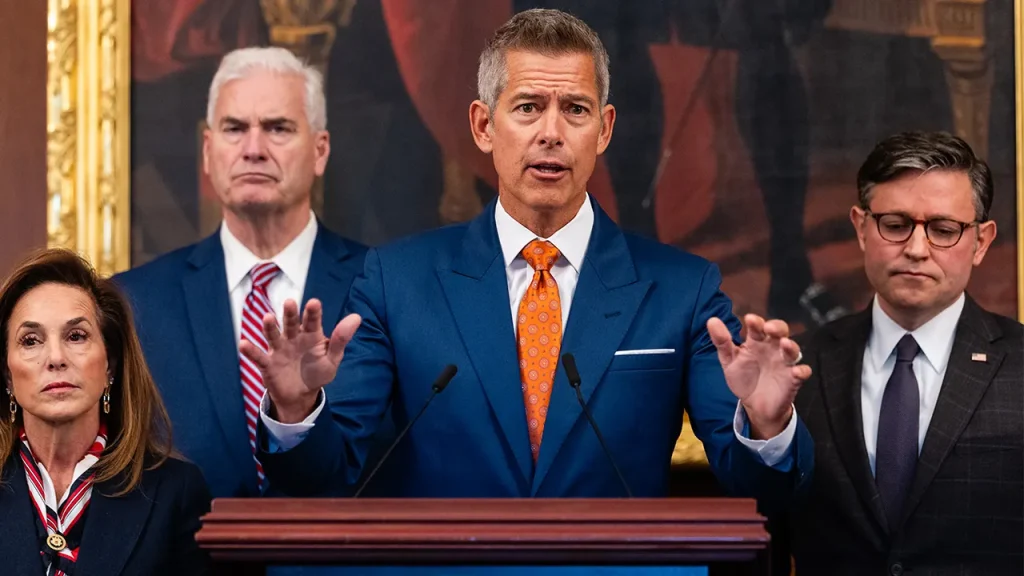California’s Commercial Driver License Controversy After Fatal Crash
In a scathing report released Thursday night, U.S. Transportation Secretary Sean P. Duffy accused California of violating federal law by issuing a commercial driver’s license to an asylum seeker whose semi-truck crash resulted in three fatalities. The report alleges that Governor Gavin Newsom’s administration disregarded a federal directive to stop issuing non-compliant licenses and revoke those improperly given – a failure that Duffy claims directly led to the loss of “three innocent souls.” This incident has quickly escalated into a major controversy, highlighting potential gaps in how states verify legal status before issuing commercial driving credentials to non-citizens.
Federal regulators had already identified significant flaws in California’s licensing system for commercial truck drivers before the tragedy occurred. According to the 2025 Annual Program Review and the Federal Motor Carrier Safety Administration (FMCSA), California’s commercial driver’s license (CDL) system contained “systemic policy, procedural, and programming errors” specifically related to non-domiciled licenses. A September 26 audit letter revealed that California had been issuing CDLs to non-domiciled drivers that remained valid even after their federal work authorization expired. That same day, the Department of Transportation issued an emergency interim rule strengthening standards nationwide, limiting eligibility to applicants with specific employment-based visas and requiring verification of legal status through the SAVE (Systematic Alien Verification for Entitlements) database.
At the center of this controversy is Jashanpreet Singh, an Indian national who was involved in the fatal crash. According to federal records, California issued Singh a CDL on June 27. Despite the September 26 DOT audit flagging “significant compliance failures” in the state’s licensing process, officials reportedly upgraded Singh’s license on October 15 – in apparent violation of the new federal restrictions. Under the emergency rule, non-domiciled commercial learner’s permits or CDLs must expire no later than the end date on the driver’s federal immigration record or after one year, whichever comes first. States are also required to maintain proof of lawful presence on file for at least two years. Just six days after this upgrade, on October 21, Singh was behind the wheel of a semi-truck involved in a crash that killed three people.
The FMCSA review indicated this wasn’t an isolated incident but rather a widespread problem in California. More than a quarter of all sampled non-domiciled CDLs in the state were issued incorrectly, including licenses given to ineligible drivers, those whose legal presence had lapsed, or instances where license expiration dates didn’t match immigration documents. As a result, the DOT ordered California to halt all new non-domiciled CDL issuances, review existing licenses for compliance, and either revoke or reissue them if they failed to meet federal standards. The state was given 30 days to comply or risk losing up to $160 million in federal highway funding – a significant financial consequence that underscores the seriousness with which federal authorities view these violations.
“My prayers are with the families of the victims of this tragedy. It would have never happened if Gavin Newsom had followed our new rules,” said Transportation Secretary Duffy in an emotionally charged statement. “California broke the law and now three people are dead and two are hospitalized. These people deserve justice. There will be consequences.” Duffy framed the issue as part of a larger national safety crisis, noting that multiple fatal crashes have involved drivers holding improperly issued non-domiciled CDLs. The Department of Transportation has now given California 30 days to identify and revoke all noncompliant licenses or face federal funding penalties, putting significant pressure on state officials to address the situation quickly.
As of the report’s publication, the California DMV had not responded to requests for comment. This incident has ignited debate about the balance between state policies on immigrant integration and federal safety regulations. It also raises questions about the effectiveness of interstate coordination on driver licensing standards and the verification processes used to ensure commercial drivers meet all legal requirements before being allowed to operate heavy vehicles on public roads. As investigations continue, families of the victims are left grieving while officials at both state and federal levels grapple with the policy failures that may have contributed to this preventable tragedy.


